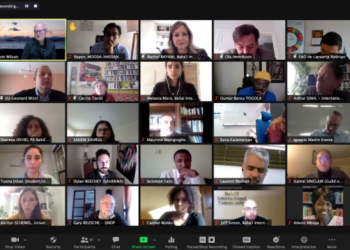FAO and BIC host first event of series on migration and agriculture: ‘Africa-Europe Mobility Patterns: From Village to City, and Beyond’
“FAO estimates that 80% of all moves involve rural areas” stated Mr. Rodrigo de Lapuerta, Director at the Liaison Office in Brussels of the Food and Agriculture Organization of the United Nations (FAO) in his opening remarks at an online event. The event was co-hosted by FAO and the Baha'i International Community (BIC) Brussels Office and took place on 10 February 2021. He added: “Migration and rural transformation, with the sustainability of agri-food systems, are totally interrelated. However, I don't think these two issues have often been treated jointly.”
Over 100 participants from academia, civil society, and the policy world in both Europe and Africa participated in the conversation, highlighting various dimensions of the links between migration and agriculture. “Many factors influence why and how people migrate from rural areas...[but] it is essential that this migration is done out of choice, rather than necessity,” said Mr. Ola Henrickson, Regional Director at the International Organisation for Migration (IOM).
The figures shared by Mr. de Lapuerta gave an indication of how many migrants are confronted with the question of rural sustainability. Dr Fraser Sugden, a professor of human geography at the University of Birmingham, exemplified this point by speaking of the project Agrumig, which aims at understanding what these rural realities mean in different contexts and how they impact migratory flows.
Throughout the conversation, several aspects of rural realities which drive migration were mentioned. Mr. Henrikson added: “Many factors influence why and how people migrate from rural areas. These include the impact of climate change and biodiversity loss, a lack of services, livelihood or educational opportunities. Often, many of these factors intersect.” Dr Cecilia Tacoli, from the International Institute for the Environment and Development (IIED), mentioned other contributing factors such as governance, value chains, and lack of diversity in economic opportunities.
“Even though these questions are highly complex, what is clear is that rural sustainability is a crucial concern when dealing with some of humanity’s most pressing challenges, such as food security and displacement,” concluded Rachel Bayani, a representative of the BIC in Brussels. “Policies, be they national or international, need to be shaped so as to ensure that sustainability.”
